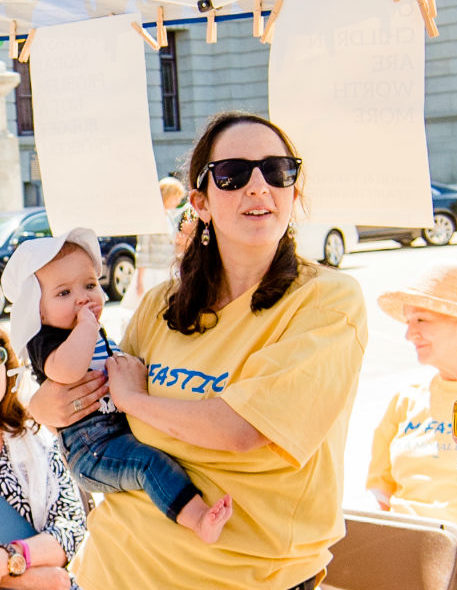At the end of June, my husband and I took our daughter, Zohar, to Harrisburg. She was six months old at the time. We each put on a tallit (the baby’s was a black onesie screen-printed with an image of a tallit) and gathered in a tent on the Capitol steps along with rabbis, cantors and members of Jewish communities across Pennsylvania. We joined people from other Philadelphia faith communities as part of a broad-based community organization called POWER. Mothers and grandmothers, fathers and children had been camping out in Harrisburg for ten days, sleeping on a church floor across from the State Capitol and fasting for a moral budget as Pennsylvania’s state budget deadline approached. We all came to cry out for a restoration of over a billion dollars of funding for education that had been slashed in recent years. We came because we are deeply troubled by the inequities in the way that public schools receive resources, with districts where there are more children of color receiving less funding. We came because we want our legislators to listen to the children and parents in communities across our state voicing their concern for our future. In order to get the attention of our representatives, and to awaken their moral imagination and ours, we sounded shofar in the balcony of the legislative session of the Pennsylvania Senate. We called on our representatives to hear the voices of their constituent families and to respond to the needs of the children in our state.
As we sounded the shofar in the ornate marble building, we channeled the voice of our matriarch Sarah in the desert. According to the midrash, the blasts of the shofar correspond to the cries of Sarah, distraught over the fate of her son. As Avraham brings their son to Mount Moriah to offer Isaac as a sacrifice, the Satan appears to Sarah and tells her what Avraham has done. Sarah is wracked with pain. Her husband has put other interests ahead of their child’s and Isaac is left broken. Sarah weeps and howls as the future dissolves before her eyes. She heaves and wails, wishing she had done more to protect her boy. Sarah’s sobs go out like the sound of the shofar, and her soul leaves her body. Along with Sarah, in Harrisburg, we cried for lost possibility, for dreams unfulfilled, for the ways we are failing our children.
As I write this piece, the new school year progresses, though no state budget has been passed in Pennsylvania. There are schools without nurses in the city of Philadelphia. School districts in the state are considering asking their employees to work for no pay or to close schools altogether. We have recently sounded the shofar in synagogues all around the world, announcing a new year and stirring the collective conscience. As we read again about Avraham and Sarah, the Father and Mother of our people, I am worried about the children.
This week, in Parashat Vayera, the shofar appears to us in the Torah for the first time. With Isaac lying strapped to the altar, his father’s blade raised to slaughter him, something catches Avraham’s eye. Off in the distance, he sees a ram caught in a tangle of branches by its horns. Avraham sees an alternate course of action and offers up the ram instead of his son. Each year on Rosh Hashanah, we blow shofar as a reminder of Avraham’s merit that he did not, in the end, sacrifice his child. As fall rolls forward, it is all too easy to let the message of the shofar get buried once again in the thicket of our routines.
When I was in college, I took a playwriting class called “Writing American Political Drama,” taught by Aisha Rahman (of blessed memory). One afternoon, as we read Sam Shepard’s States of Shock, a play about a father and a son and the trauma of war passed down the generations, Professor Rahman apologized to us for the state of the world. Our class was taken aback. Professor Rahman had poured her creative gifts into reshaping the soul of our country. Yet she carried a sense of responsibility for all the ways her generation had messed things up. I have never forgotten this moment.
As we move into this new year, I pray that we not forget the call of the shofar, whether it is voicing a parent’s sorrow or the possibility of a different way forward. The fate of each child, from Philadelphia to Ferguson to Jerusalem, is bound up in the choices of the generations who have come before, by our action and inaction, by our outcries and our silence during these times.
When I sing my baby to sleep, I want to promise her that her parents will never forget to cry out. We will cry out with Sarah. We will cry out along with our ancestors and with all those who are yet to be born. When we see our children’s future endangered, we will listen for the ram rustling about in the bush. We will sound the shofar. We will never stop looking for hidden possibilities and new ways forward. This year, let’s lift up our voices so that all of God’s children can live hopeful and free.
Rabbi Annie Lewis is Assistant Rabbi at Germantown Jewish Centre in Philadelphia.


